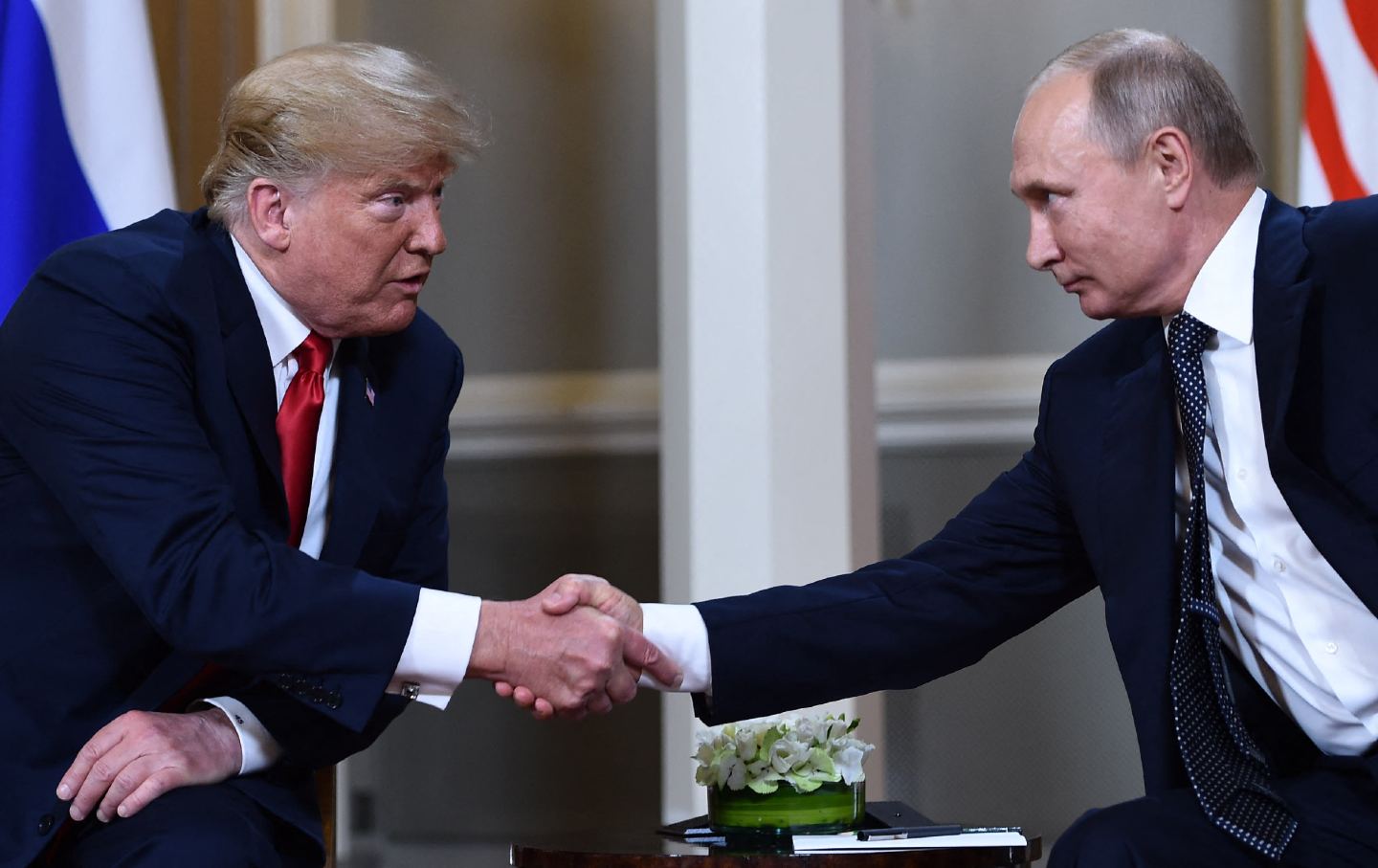No Matter What, Palestinians Will Never Give Up
The last year has shown that our love of life, and our fight for our freedom, will never be extinguished.
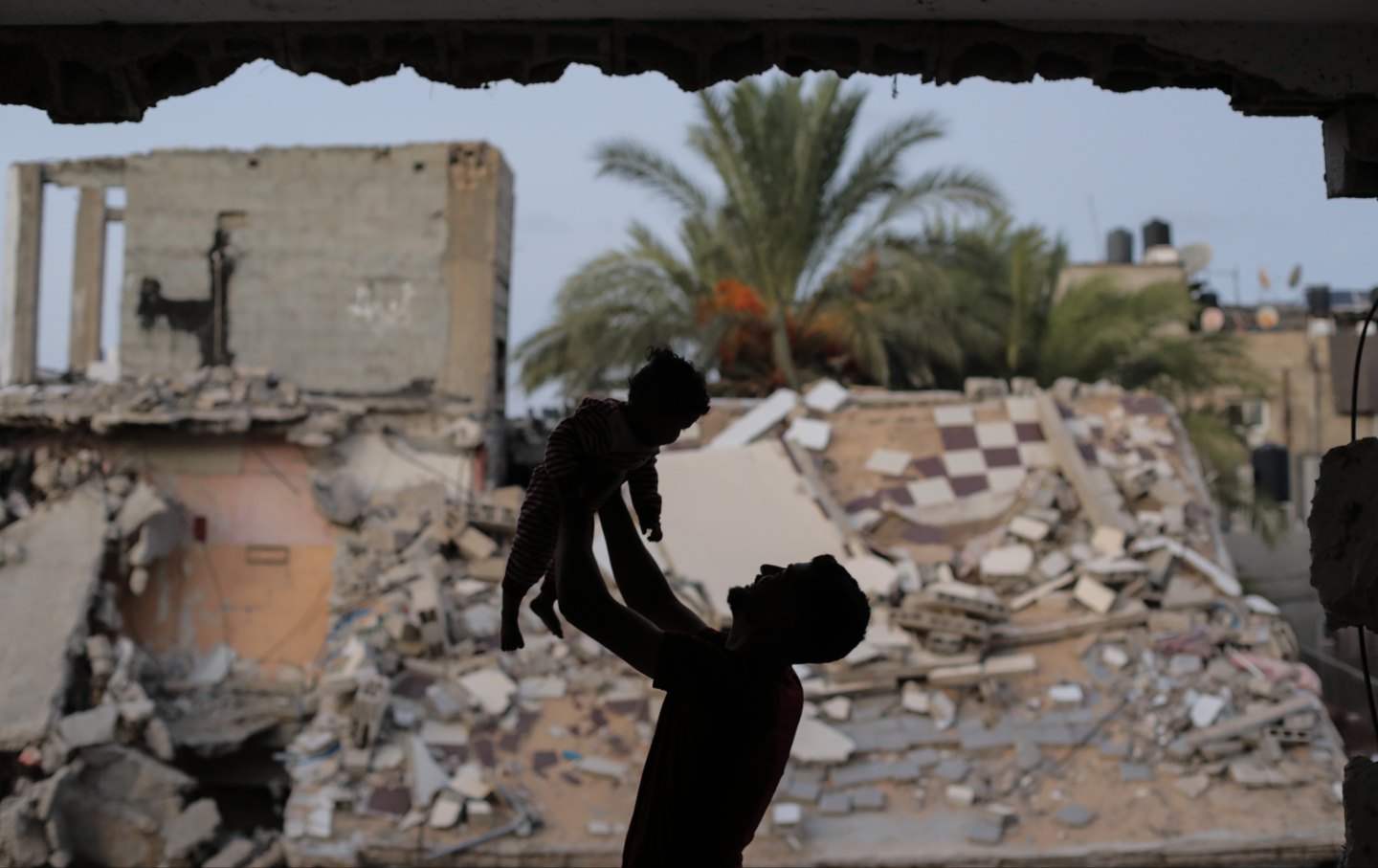
A man plays with a baby as Palestinians struggle with power outages due to Israeli attacks that destroyed the infrastructure in Gaza City, Gaza, on October 13, 2024.
(Hassan Jedi / Anadolu via Getty Images)In the last year, the world has seen the sumud, or steadfastness, of my people over and over again. You could witness it in the children who planned a press conference to beg the world to recognize their humanity after the first Al-Shifa Hospital massacre, the mothers who continued to find ways to feed their families after Palestinians were killed trying to retrieve flour, or the parents who rebuilt their tents for the fourth time after the unfathomable atrocity of massacring people in a “safe zone.”
The killing of innocent civilians is a terrible reality that Palestinians have been forced to endure with sickening regularity—including this week’s horrific attacks on north Gaza, which shocked the conscience of people across the world. Yet, even as our very existence is met with genocide, the people of Gaza embody sumud—the unbreakable refusal to submit to subjugation. It is the moral backbone of Palestinian resistance.
Gazans love life. Despite the ongoing bombardment, despite the killings, despite everything. They have devised makeshift solutions to daily life—like a hand-washing machine made from a bicycle, a clay oven made from mud and straw to bake bread, and generators assembled from whatever machine parts they can find. These are just a few acts of stubborn perseverance under siege, of sumud crystallized.
Sumud in the diaspora must be an active force propelling us to make Palestinian liberation possible. The first step is to squash the sense of protest fatigue or feeling emotionally spent by the struggle. We have no excuse to grow weary when Gazans create sumud by their life and blood.
Historically, sumud has been both active and passive. Passively, the Palestinians in Gaza and the West Bank embody it by remaining on their land—hence the Palestinian phrase “existence is resistance.” Actively, sumud has meant replanting the olive trees burned after each settler assault, rebuilding the homes demolished with an underlying assumption that it may be demolished again, and resisting forced expulsion from the land.
In the diaspora, our sumud must be equally tangible, not an abstract ideal. Sumud cannot simply be just about bearing witness to death and dispossession, as some would suggest. Sitting with the images of inhumanity is a minimum. We have to believe that what we do in our daily lives is having an impact, and not succumb to the despair that Israeli society so desperately wants to create.
The second step is a commitment to providing the means for survival and resistance. This material support is not just charity but a deeper solidarity with the Palestinian cause. That means pressing elected officials in the United States and elsewhere to stop funding and arming another nation’s war. We in the Palestinian diaspora, alongside our peers in the West, must continue to use our privilege in a “free” nation to protest by every means. We must hold corporations who profit off the violence accountable through boycotts and divestment. We must work to end the complicity of organizations sending weapons or technologies to Israel.
We must also be granular and targeted in our support, from sending eSIMs so Gazan journalists can continue doing necessary work to helping Western doctors establish telemedicine services to alleviate some pressure from decimated hospitals that are left in Gaza.
Israel has tried to break sumud. The physical destruction alone has been part of this effort: over 60 percent of Gazan homes destroyed after more bombs dropped than the totality of World War II; the ethnocide of bombing of mosques, churches, libraries, museums, and so much more; the planting of Israeli flags over the ruins of Gazan society; the publishing of plans to turn parts of Gaza into Israeli resorts; and holding over 9,000 Palestinians in Gaza and the West Bank hostage, where they are arbitrarily detained and tortured in detention camps.
Israel’s efforts have been similar in Gaza and the West Bank for decades: the burning of Palestinian olive trees, a symbol of our connection to the land; banning the Palestinian flag; and expanding illegal settlements that erase Palestine from the map. However, Palestinians have never cowered to Israel’s horrors—and they never will. In fact, as the world has become increasingly used to Palestinian blood, and done nothing to stop it, we must reaffirm the right of Palestinians to defend their land and fight for their freedom.
Israel has been unable to subdue Gaza despite relentless military campaigns. Now, the Zionist project has shifted focus to the West Bank, targeting refugee camps in Jenin, where the population has been deeply entrenched in the struggle for liberation.
The refugee camps in the West Bank, particularly in Nablus, Jenin, and Tulkarem, are not merely places where the displaced survive. They are incubators of the collective Palestinian consciousness, which continues to reject colonialism and the violence that sustains it. Israel’s tactics in the West Bank are strikingly similar to those it has used in Gaza. The siege mentality, the demolition of homes, the targeted assassinations of resistance leaders—these are tools of occupation that have been wielded for decades. And yet, just as these measures have failed in Gaza, they are destined to fail in the West Bank. Occupation, no matter how brutal, cannot erase the will of a people determined to be free.
Now, we see our Lebanese neighbors, and brothers in struggle, experiencing the same acts of state-sponsored violence—villages across the south forced to flee as their homes are indiscriminately bombed under the pretext of fabricated claims of occupation officials. They, too, exercise resistance by simply existing on the land and refusing to submit to the acts of terror inflicted upon them.
Sumud is a uniquely Palestinian motif that has taken root on our land over generations. Our sumud has emerged in the context of our people’s ongoing dispossession and struggle for self-determination. It is our collective will to maintain our identity even as Western colonial powers would aim to deny the word “Palestine” itself.
Palestinians have shown what it means to see our land get stolen yet still believe in our right to return to it. We have taught the world what it means to live under occupation yet still hope for a better future. We have shown what it means to live through generations of ethnic cleansing yet never lose pride in our being.
Hope is a nonnegotiable part of the struggle. It was at this time last year that I finally understood the sumud of my people—our inability to be crushed and a spirit of resistance that exists in every trace of the Palestinian landscape.
We cannot back down
We now confront a second Trump presidency.
There’s not a moment to lose. We must harness our fears, our grief, and yes, our anger, to resist the dangerous policies Donald Trump will unleash on our country. We rededicate ourselves to our role as journalists and writers of principle and conscience.
Today, we also steel ourselves for the fight ahead. It will demand a fearless spirit, an informed mind, wise analysis, and humane resistance. We face the enactment of Project 2025, a far-right supreme court, political authoritarianism, increasing inequality and record homelessness, a looming climate crisis, and conflicts abroad. The Nation will expose and propose, nurture investigative reporting, and stand together as a community to keep hope and possibility alive. The Nation’s work will continue—as it has in good and not-so-good times—to develop alternative ideas and visions, to deepen our mission of truth-telling and deep reporting, and to further solidarity in a nation divided.
Armed with a remarkable 160 years of bold, independent journalism, our mandate today remains the same as when abolitionists first founded The Nation—to uphold the principles of democracy and freedom, serve as a beacon through the darkest days of resistance, and to envision and struggle for a brighter future.
The day is dark, the forces arrayed are tenacious, but as the late Nation editorial board member Toni Morrison wrote “No! This is precisely the time when artists go to work. There is no time for despair, no place for self-pity, no need for silence, no room for fear. We speak, we write, we do language. That is how civilizations heal.”
I urge you to stand with The Nation and donate today.
Onwards,
Katrina vanden Heuvel
Editorial Director and Publisher, The Nation
More from The Nation
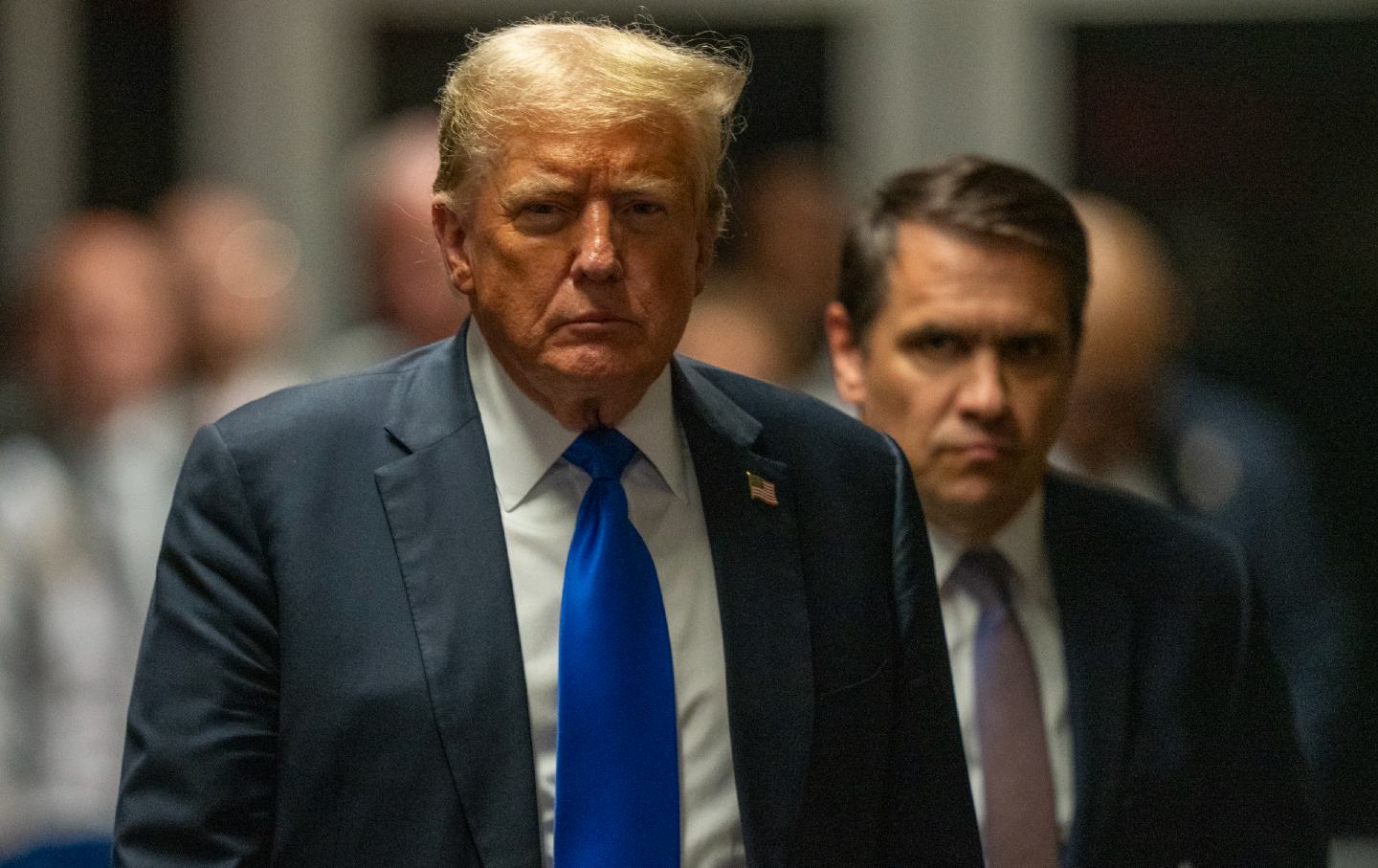
Trump’s Second Presidency Will Only Accelerate America's Imperial Decline Trump’s Second Presidency Will Only Accelerate America's Imperial Decline
Trump is on track to bring a hasty end, silent or otherwise, to an “American Century” of global dominion.

Warning From the Past Warning From the Past
In a new film, journalists confront a dictator.

The Case Against Joe Biden for Complicity in Genocide The Case Against Joe Biden for Complicity in Genocide
The ICC has applied for an arrest warrant for Benjamin Netanyahu. But Israel’s assault on Gaza has been made possible by US support.
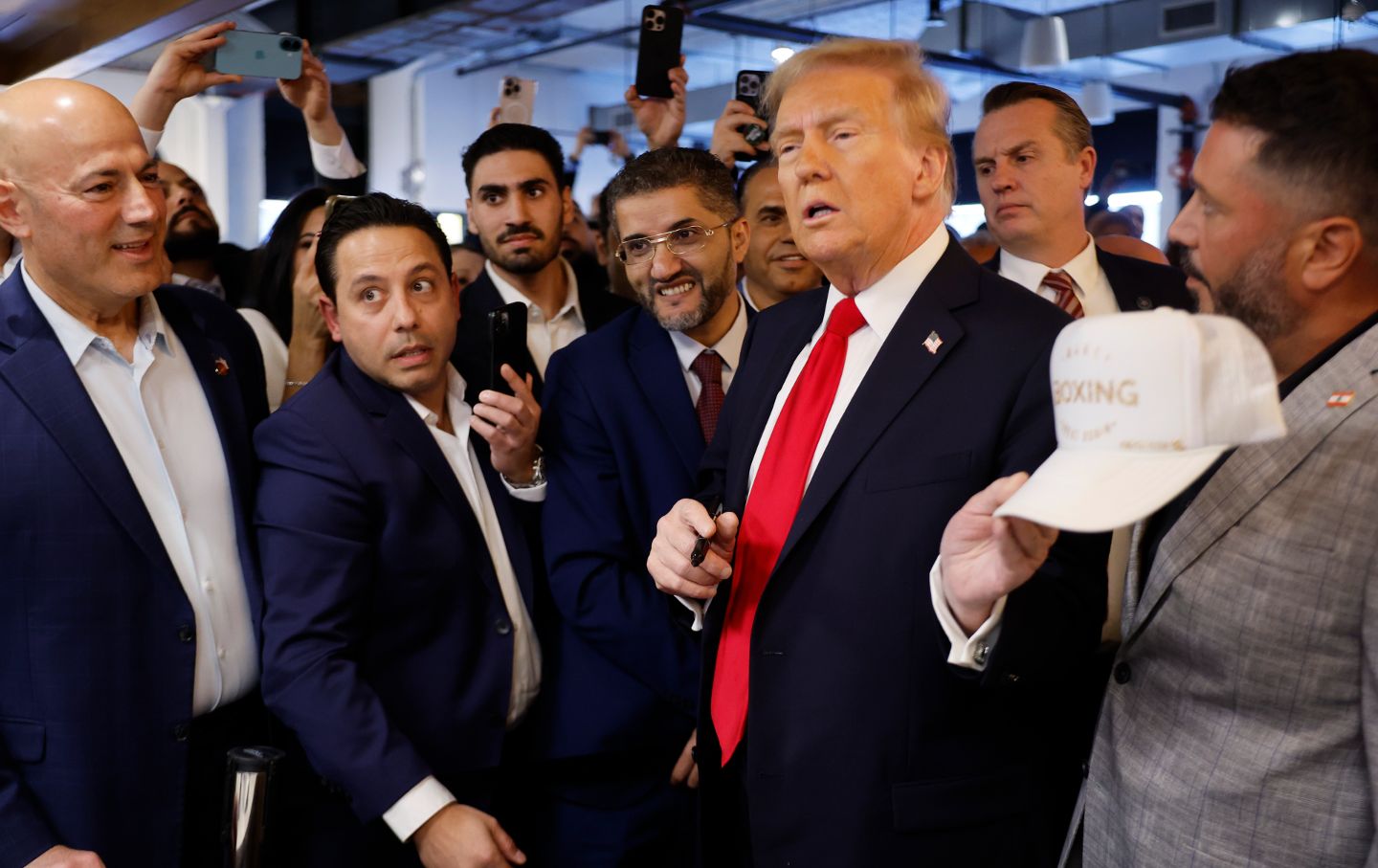
Gazans Heard Trump's Promises. Now They Want Him to Keep Them. Gazans Heard Trump's Promises. Now They Want Him to Keep Them.
Trump made a direct pitch to end the war on Gaza. The people still living there were listening.
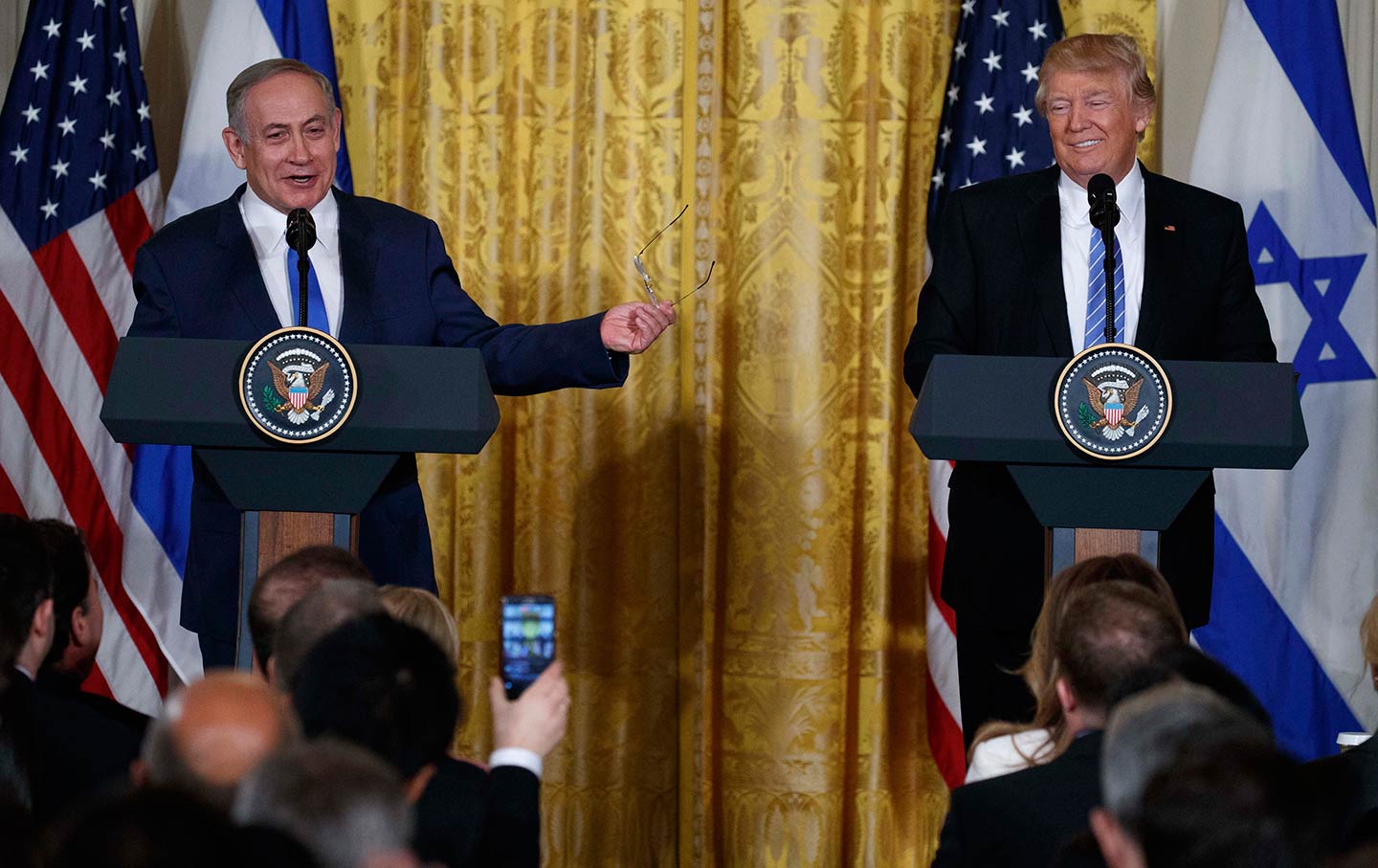
The Fallout of Biden’s Middle East Policy Is Now Trump’s Responsibility The Fallout of Biden’s Middle East Policy Is Now Trump’s Responsibility
In Trump’s hands, the country's diplomatic strategy in the Middle East can only get worse.

